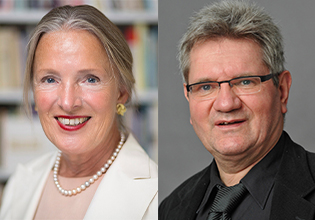News | Friday, 25 September 2020
Ute Frevert and Robert Schlögl are new members of the presidium

Foto links: Arne Sattler
The Senate of the Leopoldina elected a new Vice President and a new Secretary yesterday. Chemist and catalysis researcher Robert Schlögl (Mülheim an der Ruhr, Berlin) is now one of the four Vice Presidents of the Academy. He succeeds physicist Gunnar Berg (Halle/Saale), who is leaving office after serving two terms. The Senate also elected historian Ute Frevert (Berlin) as Secretary of class IV (humanities, social and behavioural sciences) of the Leopoldina. She succeeds psychologist Frank Rösler (Hamburg), who held this office for ten years.
Medical historian Heinz Schott (Bonn), who served in the Presidium for ten years as commissioner of archives, library, and long-term projects in an advisory capacity, is also stepping down. Plant geneticist Ulla Bonas (Halle/Saale) and computer scientist Thomas Lengauer (Saarbrücken) were re-elected for a second five-year term of office as Vice President and member of the Presidium.
Robert Schlögl is concerned with questions of the production, storage, and transport of energy. He is researching energy conversion processes in nature and the significance of catalysts within these processes. In individual research projects, he is working, for example, on the conversion of light into electrical energy, storage materials for hydrogen, the catalytic splitting of water, and further development of fuel cells. Robert Schlögl's research aims to develop new, powerful catalysts while emphasizing the sustainability of the processes. He seeks to understand the basic chemical reactions of these processes in order to use them for new energy systems.
Schlögl became a member of the Leopoldina's chemistry section in 2011. Since then, he has been diversely involved in the academy's tasks, especially in science-based policy advice. For example, Schlögl was one of the initiators of the project "Energy Systems of the Future" (ESYS), with which the German academies of science accompany the energy transition. From 2013 to 2017, he served as chairman of the ESYS steering committee. Schlögl is co-author of several Leopoldina statements. He contributed to the statement "Coronavirus Pandemic ‒ Sustainable ways to overcome the crisis" in spring. He was also involved in the ad-hoc-statement "Energy transition 2030: Europe's path to carbon neutrality" published in June of this year and the ad-hoc statement "Climate targets 2030: Towards a sustainable reduction of CO₂ emissions" published in 2019.
Ute Frevert is a German historian. Her work focuses on the history of modern societies and their cultural systems. Frevert examines which fields of action were assigned to women and men and how (and why) these assignments changed. In this context, she works on topics such as the social and cultural coding of violence, as in duels and in the military, or the formation of honor and empathy. Other focal points of her work are the development of European identities and identifications and the history of political communication, especially between citizens and representatives of the state. In 2008, she established the history of feelings (history of emotions) as an autonomous field of research situated between historical science and psychology. Frevert has been a member of the Leopoldina's cultural sciences section since 2004. She is co-author of the Leopoldina's recently published sixth ad-hoc statement on the coronavirus pandemic.
The Senate session, including the election of new Presidium members, is usually held on the eve of the Leopoldina Annual Assembly. Due to the coronavirus pandemic, this year's Leopoldina Annual Assembly themed "Biodiversity and the Future of Diversity" has been postponed to September 2021.
